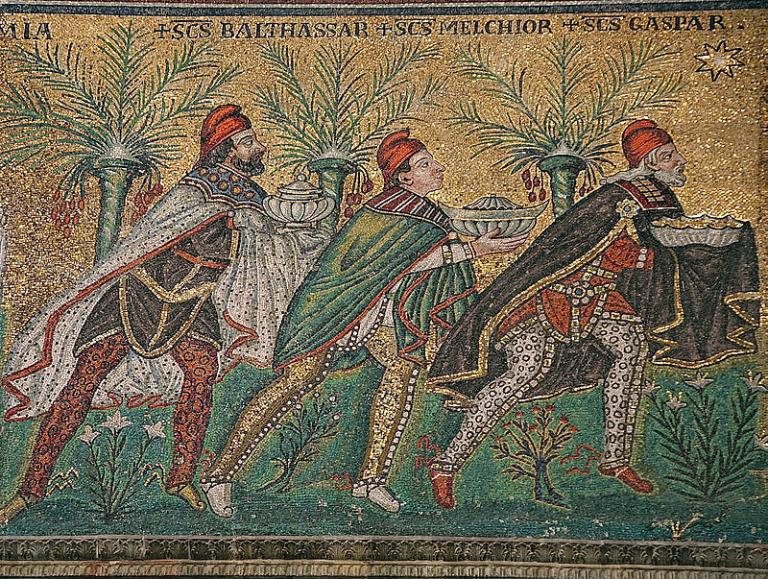
Detail from an AD 526 Byzantine mosaic in the Church of Sant’ Apollinare Nuovo, in Ravenna
(Wikimedia Commons public domain image)
A few days ago, early last week, I gave a brief interview to BYUradio about the “wise men” of the gospel of Matthew, their possible identities, how many of them there were, and so forth. It was broadcast for the first time on Tuesday of last week, and it is now accessible online at your convenience and at no charge. It lasts something like ten minutes. Maybe a bit longer:
***
I published this column in the Deseret News back just before Christmas in 2013 or so:
Historians of Christianity have always sought to understand how certain Jews, despite the strict monotheism in which they were raised, came to believe that the man Jesus was divine—“that,” in other words, “God was in Christ, reconciling the world unto himself” (2 Corinthians 5:19).
And Christians did indeed pay divine honors to Jesus from quite early times. For example, Pliny the Younger, governor of Pontus/Bithynia (a region of today’s Turkey) from 111-113 AD, famously reported to his boss, the Emperor Trajan, that the Christians within his jurisdiction “were accustomed to meet on a fixed day before dawn and sing responsively a hymn to Christ as to a god.”
Assisted by such New Testament scholarship as that of the so-called “Tubingen school,” which proposed a very late date for the four gospels, some writers argued that Jesus himself never claimed deity. It was, they said, relatively late Gentile converts, with their notions of demigods like Hercules, who brought such ideas into Christianity, ultimately transforming the simple, humane teachings of a reforming Jewish peasant rabbi into the arcane theology of the Nicene Creed. And, in fact, Pliny’s Christians may well have been mostly if not entirely Gentiles, rather than Jews.
However, historical facts eventually defeated the “Tubingen school”; many New Testament documents appear to be earlier than liberal German scholarship once thought. And historical facts seem to be undermining the theory that the divinity of Christ was a relatively late Gentile invention. There’s simply insufficient time for a long, gradual evolution.
Contemporary New Testament scholars such as Larry Hurtado, James Dunn, and N. T. Wright persuasively argue that the deification of Christ is extremely early in Christianity, and native to it, rather than merely a late foreign innovation. This change in attitude has come, in part, from a long overdue recognition of the historical significance of the letters of Paul—letters that are indisputably early and clearly datable.
In 1 Corinthians 8:6, for example, which was almost certainly written around A.D. 54, Paul includes Christ in the famous “shema” declaration of Deuteronomy 6:4 (“Hear, O Israel! The Lord our God is one lord!”) Moreover, in remarkable texts such as Philippians 2 and Colossians 1, and elsewhere as well, Paul takes Old Testament passages plainly written about Jehovah (or Yahweh)—rendered in the Septuagint Greek translation as “kyrios” or “Lord”—and makes them refer to Jesus.
Moreover, Margaret Barker contends that belief in Christ’s divinity arose precisely out of Jewish soil, because it reflects the very oldest Hebrew beliefs—which, almost but not quite forgotten, were not strictly monotheistic as we’ve long imagined. The earliest Jewish Christians tapped into the oldest layer of Israelite religion, she says; no late Gentile converts are required to explain Christian belief in Jesus’ deity.
In fact, Jesus himself seems to have had an exalted view of his own authority and status. Thus, when he ascends a hill to deliver his “sermon on the mount,” he may be consciously contrasting himself with Moses, the great founding prophet of Judaism, who ascended a mountain to receive the law from God. “Ye have heard that it was said by them of old time,” he repeatedly declares during that sermon, “but I say unto you” (for examples, see Matthew 5:21-22, 27-28).
The famous observation by C. S. Lewis comes inescapably to mind at this point:
“I am trying here,” Lewis wrote in “Mere Christianity,” “to prevent anyone saying the really foolish thing that people often say about Him: ‘I’m ready to accept Jesus as a great moral teacher, but I don’t accept His claim to be God.’ That is the one thing we must not say. A man who was merely a man and said the sort of things Jesus said would not be a great moral teacher. He would either be a lunatic—on the level with the man who says he is a poached egg—or else he would be the Devil of Hell. You must make your choice. Either this man was, and is, the Son of God: or else a madman or something worse. You can shut Him up for a fool, you can spit at Him and kill Him as a demon; or you can fall at His feet and call Him Lord and God. But let us not come with any patronizing nonsense about His being a great human teacher. He has not left that open to us. He did not intend to.”
Posted from Richmond, Virginia












